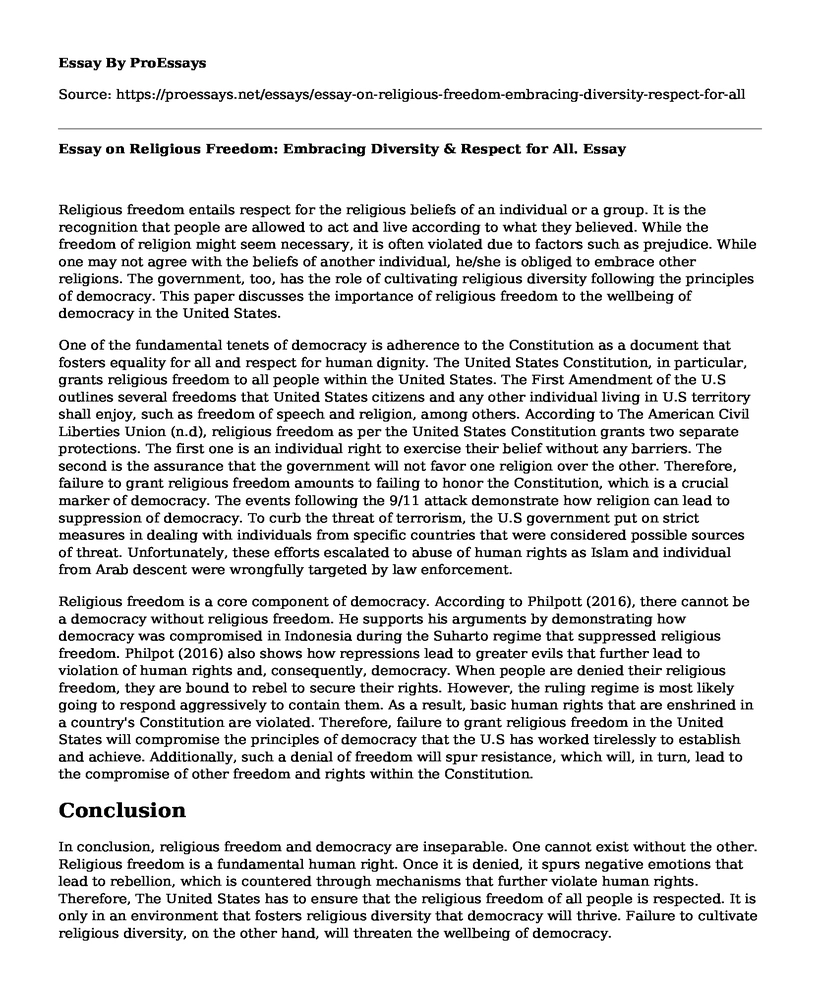Religious freedom entails respect for the religious beliefs of an individual or a group. It is the recognition that people are allowed to act and live according to what they believed. While the freedom of religion might seem necessary, it is often violated due to factors such as prejudice. While one may not agree with the beliefs of another individual, he/she is obliged to embrace other religions. The government, too, has the role of cultivating religious diversity following the principles of democracy. This paper discusses the importance of religious freedom to the wellbeing of democracy in the United States.
One of the fundamental tenets of democracy is adherence to the Constitution as a document that fosters equality for all and respect for human dignity. The United States Constitution, in particular, grants religious freedom to all people within the United States. The First Amendment of the U.S outlines several freedoms that United States citizens and any other individual living in U.S territory shall enjoy, such as freedom of speech and religion, among others. According to The American Civil Liberties Union (n.d), religious freedom as per the United States Constitution grants two separate protections. The first one is an individual right to exercise their belief without any barriers. The second is the assurance that the government will not favor one religion over the other. Therefore, failure to grant religious freedom amounts to failing to honor the Constitution, which is a crucial marker of democracy. The events following the 9/11 attack demonstrate how religion can lead to suppression of democracy. To curb the threat of terrorism, the U.S government put on strict measures in dealing with individuals from specific countries that were considered possible sources of threat. Unfortunately, these efforts escalated to abuse of human rights as Islam and individual from Arab descent were wrongfully targeted by law enforcement.
Religious freedom is a core component of democracy. According to Philpott (2016), there cannot be a democracy without religious freedom. He supports his arguments by demonstrating how democracy was compromised in Indonesia during the Suharto regime that suppressed religious freedom. Philpot (2016) also shows how repressions lead to greater evils that further lead to violation of human rights and, consequently, democracy. When people are denied their religious freedom, they are bound to rebel to secure their rights. However, the ruling regime is most likely going to respond aggressively to contain them. As a result, basic human rights that are enshrined in a country's Constitution are violated. Therefore, failure to grant religious freedom in the United States will compromise the principles of democracy that the U.S has worked tirelessly to establish and achieve. Additionally, such a denial of freedom will spur resistance, which will, in turn, lead to the compromise of other freedom and rights within the Constitution.
Conclusion
In conclusion, religious freedom and democracy are inseparable. One cannot exist without the other. Religious freedom is a fundamental human right. Once it is denied, it spurs negative emotions that lead to rebellion, which is countered through mechanisms that further violate human rights. Therefore, The United States has to ensure that the religious freedom of all people is respected. It is only in an environment that fosters religious diversity that democracy will thrive. Failure to cultivate religious diversity, on the other hand, will threaten the wellbeing of democracy.
References
Philpott, D. (2016). Religion: A friend of democracy. Retrieved May 17, 2020, from https://www.religiousfreedominstitute.org/cornerstone/2016/6/28/religion-a-friend-to-democracy
The American Civil Liberties Union. (n.d). Religious liberty: What's at stake. Retrieved May 17, 2020, from https://www.aclu.org/issues/religious-liberty
Cite this page
Essay on Religious Freedom: Embracing Diversity & Respect for All.. (2023, Aug 08). Retrieved from https://proessays.net/essays/essay-on-religious-freedom-embracing-diversity-respect-for-all
If you are the original author of this essay and no longer wish to have it published on the ProEssays website, please click below to request its removal:
- Essay Sample on Origins of the Constitution
- Mayor Bloomberg Speech on Ground Zero Mosque at Governor's Island
- Essay on Government Structure: 3 Branches of Power & Responsibility
- Essay Sample on Religious Beliefs, Rituals, and Charms: Exploring Human Stress Relief
- Essay Example on Trump's 2017 NSS: A Roadmap for US Prosperity & Security
- Essay Sample on Electoral College System Should Be Banned
- Government Spending and Taxation - Report Example







